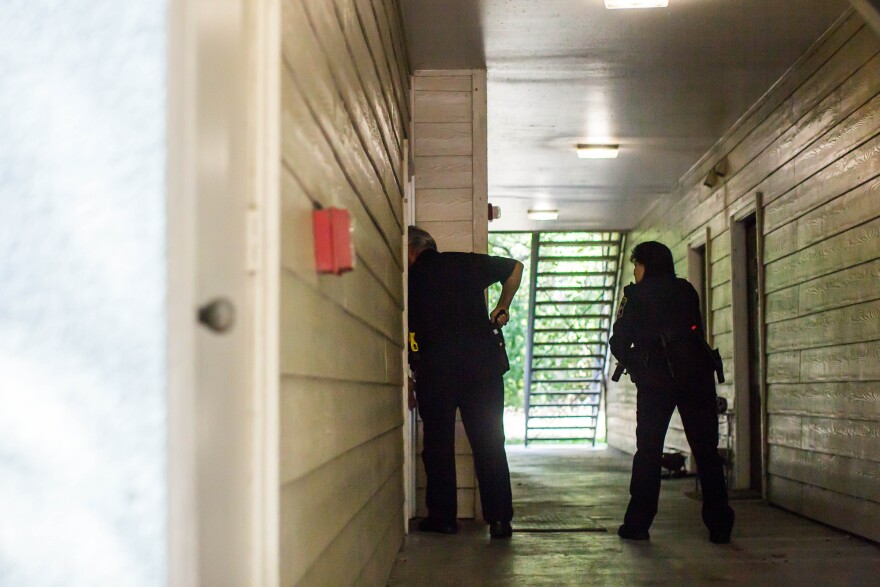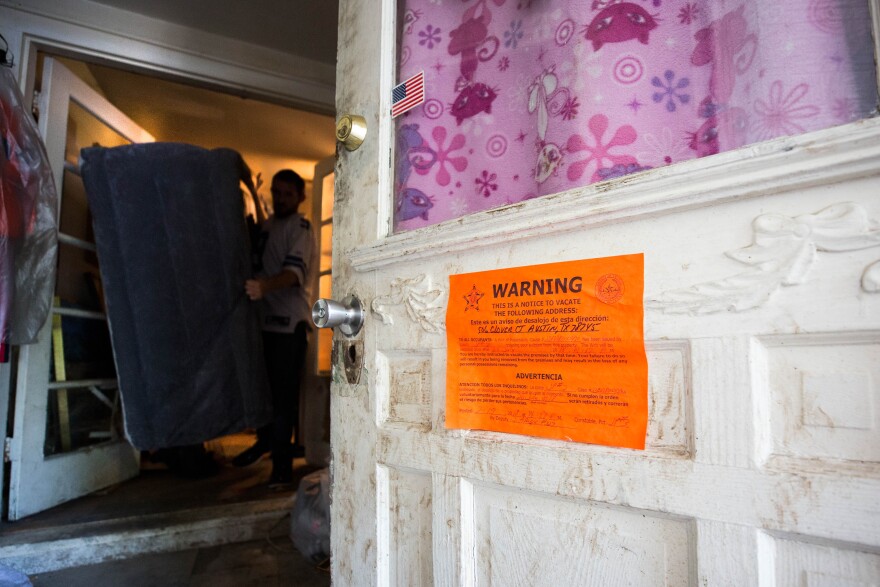Texas lawmakers have heeded calls from top Republicans, including Gov. Greg Abbott, to file bills to "crack down on squatters."
The term is used to describe someone illegally occupying a home.
"This is an important bill that will try to end this squatters' plague that has swept from coast to coast," Sen. Paul Bettencourt, a Republican from Houston, said at a Senate hearing earlier this month. He did not provide data to prove that squatting is widespread.
But these bills would impact renters, not just squatters who never had a right to be on the property in the first place. Senate Bill 38 and its counterpart in the House would make it easier to evict people in the state, including presumably tens of thousands of renters with leases.
While the push for these bills has been led by Republicans, several Democrats have also signed onto them.
Proponents of the legislation say it's necessary to ensure landlords can regain possession of their property faster. Tenant advocates warn the bills could strip renters of legal rights in a state where they currently have few.
"This is the equivalent of using a shotgun in a schoolyard to kill a mosquito. This is not a squatter bill," said Nelson Mock, a housing attorney with Texas RioGrande Legal Aid, which represents tenants in much of the state. "This is a bill that undermines tenants' rights all across the board."
Concerns about legal rights
Current law requires landlords and tenants be given a hearing in front of a judge who decides whether to grant an eviction.
Evictions are often cut-and-dry cases where a judge is deciding whether a contract (the lease) has been violated. Judges commonly spend just minutes on each case. On a recent Tuesday morning, a judge in Southwest Austin heard a dozen eviction cases in about half an hour.
SB 38, which has passed the Senate, allows for what's called a summary disposition. It would give judges the option to not hold a hearing before a tenant is evicted.
If a judge agrees, a landlord could file evidence showing a tenant has not paid rent or has violated their lease in another way, such as having a pet not allowed under the agreement. The renter would get four days to respond to the landlord's filing. If they don't, the judge could sign an order to have them evicted.

Supporters of this provision say it allows judges to handle the most straightforward cases quicker.
"These reforms are going to improve efficiency," Corey Rogers, an attorney and representative of the Texas Apartment Association, told senators in March, "and provide fairness for all owners of rental property who rely on that income to cover their mortgages and other expenses."
But opponents of the bill worry it could lead to tenants being locked out of their own eviction proceedings, stripping them of the right to defend themselves.
"Due process is a constitutional right. You can't change that," Mark Melton, a lawyer who founded the Dallas Eviction Advocacy Center, argued in front of lawmakers last month.
"I also have a constitutional right to my property," Rep. Jeff Leach, a Republican from Plano, snapped back.
A renter would still have the right to appeal the ruling. But barring an appeal, someone could be forced from the home they were living in in the span of a week.
Currently, eviction proceedings in Texas take at least several weeks.
What is squatting?
Sen. Bettencourt, the lead author of SB 38, has called squatting a "plague." Lawmakers have touted stories like the one of a homeowner in Mesquite, Texas, who reportedly spent more than a year trying to evict a man who moved into her home while she was out of town.
Bettencourt has said at hearings he estimates there could be upwards of 10,000 squatting cases in the state, although he has not given a timeframe for this number.
People who study squatting in the U.S. say there is no good data on the problem. And that's likely because there are so few cases.
"I think it's quite uncommon in the U.S.," said Claire Herbert, a sociology professor at the University of Oregon who has studied squatting practices in the U.S.
KUT reached out to justices of the peace to ask how many squatting cases they typically handle. Judge KT Musselman in Williamson County said he has seen one or two squatting cases in the six years he's been a judge. He called it a "[t]otal non-issue" in the precinct he oversees.
But judges like Musselman may see dozens of eviction cases a week. Last year, just over 300,000 landlord-tenant cases were filed in Texas, the vast majority of which were eviction cases, according to the Texas Office of Court Administration.
The term "squatting" does not appear in Texas property law. But lawyers told KUT these cases are typically handled as either "forcible entry and detainer" cases, which are civil issues, or as trespassing cases, which are criminal.
Some opponents of these bills have called them Trojan horses — eviction bills dressed up as so-called squatter legislation.
In 2024, the National Housing Law Project began tracking "anti-squatter" legislation across the country, including bills filed in Georgia, Alabama and Florida. Housing lawyers wrote that while these bills were "nominally targeted at squatters," they also impacted renters and people who initially had a legal right to be in a home.
KUT reached out to Bettencourt's office for this story, but was unable to secure an interview. KUT also reached out to the office of Rep. Angie Chen Button, a Republican from the Dallas area who is the lead author on a similar bill in the House, but did not hear back.
Other changes to eviction law
SB 38 would also change other parts of eviction law, including how landlords can tell tenants they intend to file an eviction.
State law currently gives landlords several options, including delivering the notice in person, mailing it or attaching it to the inside of a tenant's front door. SB 38 would give landlords more options, including placing the notice somewhere inside the apartment.
Supporters say this gives landlords more flexibility. But opponents worry it could be abused.
"Under this bill a landlord technically could go into a tenant's apartment, put it under a pile of papers, and that would be sufficient notice," said Shoshana Krieger, project director for Building and Strengthening Tenant Action, a nonprofit that helps low-income renters.
Another change under this bill would give landlords the option to hire someone other than a law enforcement officer to remove a tenant from the home.

Under current law, if a renter does not leave within a certain amount of time after a judge orders an eviction, a landlord can ask for a writ of possession. This gives constables the ability to forcibly take someone out of a home and put their belongings outside.
Under SB 38, if the constable's office is busy and this doesn't happen within five days, the landlord would have the right to hire another law enforcement officer, including an off-duty officer, to do it.
Again, supporters argue this gives landlords flexibility and ensures evictions aren't delayed. But opponents of the bill and others like it worry this could unnerve renters.
"It could be a person who just looks like someone off the street who has no identification … that's physically removing you and your family from their home," said Ben Martin, research director at Texas Housers, a nonprofit that educates low-income residents about housing.
Lawmakers have passed SB 38 out of the Senate. It's been sent to a committee in the House.
Copyright 2025 KUT 90.5


